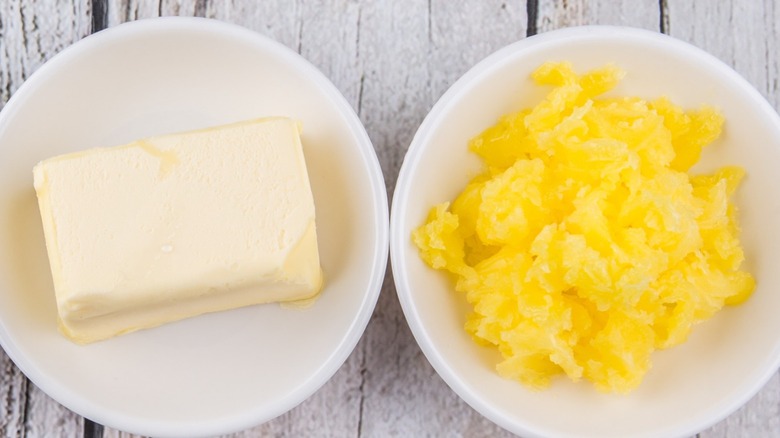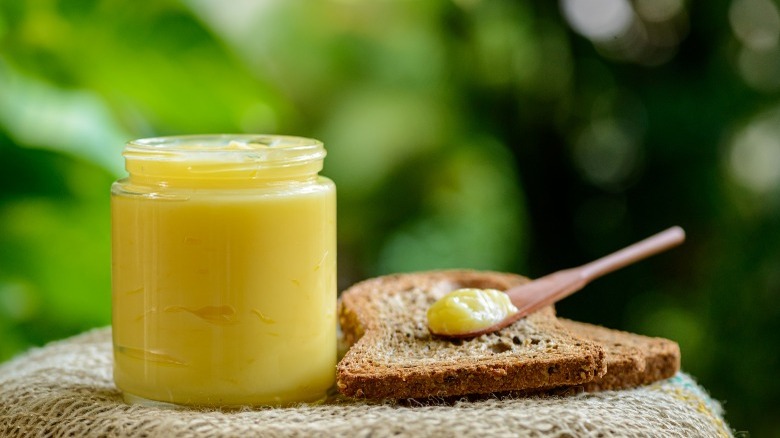Butter Vs. Ghee: Is There A Nutritional Difference?
Julia Child once said, "With enough butter, anything is good" (via Taste of Home), but what about when it comes to nutrition? The truth is that it's a fat — that's the reason everything butter touches tastes better. Fats allow flavors to linger longer on the tongue, improving feelings of satiety (via Healthline). Not only that, fats like butter help us with hormone production, aid the body's immune system, and assist us in absorbing key nutrients like vitamins A, D, E, and K. And butter brings a bit more to the table — like vitamin B12 and A (via Real Simple).
On the flip side though, butter is a saturated fat similar to lard and other animal-based fats, which, while effective for energy storage, also raises your LDL (low-density lipoprotein) and total blood cholesterol levels. And while it can raise beneficial HDL (high-density lipoprotein) as well, researchers still aren't convinced that this results in any marked nutritional wins (via Harvard Public Health). So, there are some small nutritional benefits that come with butter and other saturated fats (certainly when compared to refined carbohydrates) but that information is often tempered with more traditional advice by experts to avoid overdoing it.
But what about butter's gilded sister, Ghee? Is it a more nutritious option?
What is ghee?
A form of clarified butter, ghee originated in India (via The Washington Post) as a way to preserve butter in the heat of the region. It's made by simmering butter, heating it past melting, until the milk solids have separated and its water has evaporated. After straining out the milk solids, you are left with only the slightly caramelized notes of this nutty, flavorful oil (via Bon Appétit). While this reduces the lactose even more (butter itself is already fairly low in lactose), it slightly increases its fat content, concentrating it compared to butter (via Healthline).
According to the Washington Post, ghee's roots are thousands of years deep. Its traditions have been passed down from generation to generation, with appearances in Hindu mythology, Sanskrit texts, and are used to this day in Ayurvedic medicine and traditionally in religious ceremonies and other important life celebrations. In recent years its gained popularity among Keto, Paleo, and Bulletproof diet aficionados for its fat content, high heat applications, and low lactose content.
Is ghee better than butter?
Ghee is a golden child when it comes to cooking at higher temperatures due to its higher smoke point, which MasterClass says is around 450 degrees Fahrenheit as compared to butter's smoke point of 302 degrees Fahrenheit. When it comes to flavor, ghee's clean mild and lightly grassy tang can't be beaten (though, neither can the taste of browned butter). But does that mean ghee is more nutritious than butter? Not necessarily. Nutritionally butter and ghee are pretty close and that makes sense since they are very nearly one and the same — save for the lactose.
In the potential plus column for ghee is the fact that when it's heated it produces less acrylamide, a chemical compound created when cooking starch-laden foods at high heat (via Healthline). But while acrylamide has been shown to be a cancer risk in lab animals, no one is sure yet if the same is true in humans. Another of ghee's assets is that it is slightly higher in butyric acid, shown to be beneficial for gut health (via World Journal of Gastroenterology).
While ghee may appear to have a slight advantage nutritionally over butter, the differences themselves appear somewhat negligible. The biggest advantages favor ghee in high-heat cooking applications and for those who are lactose or casein intolerant, as ghee is virtually free of either, while butter still contains them in small amounts. Whichever you choose, keep in mind that old adage, "everything in moderation."


